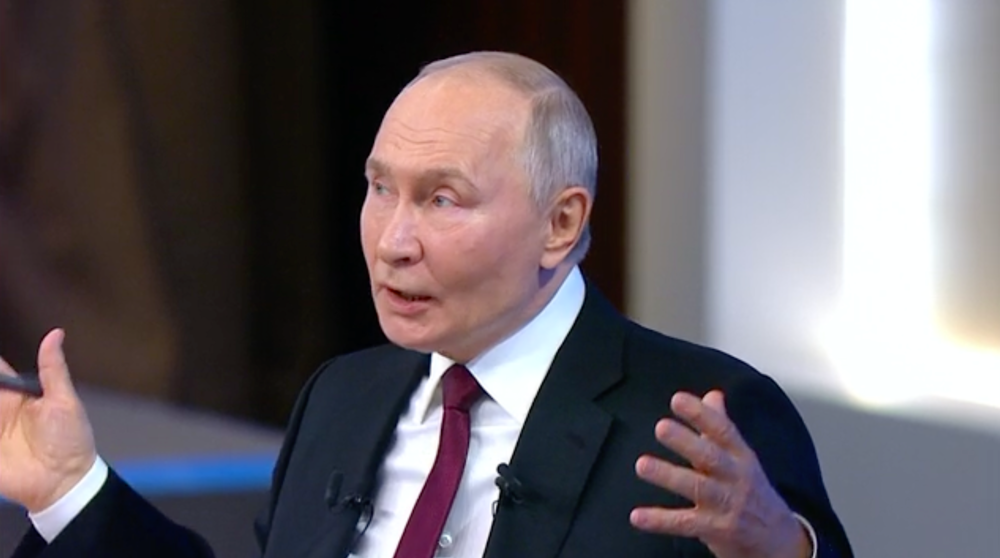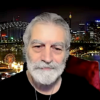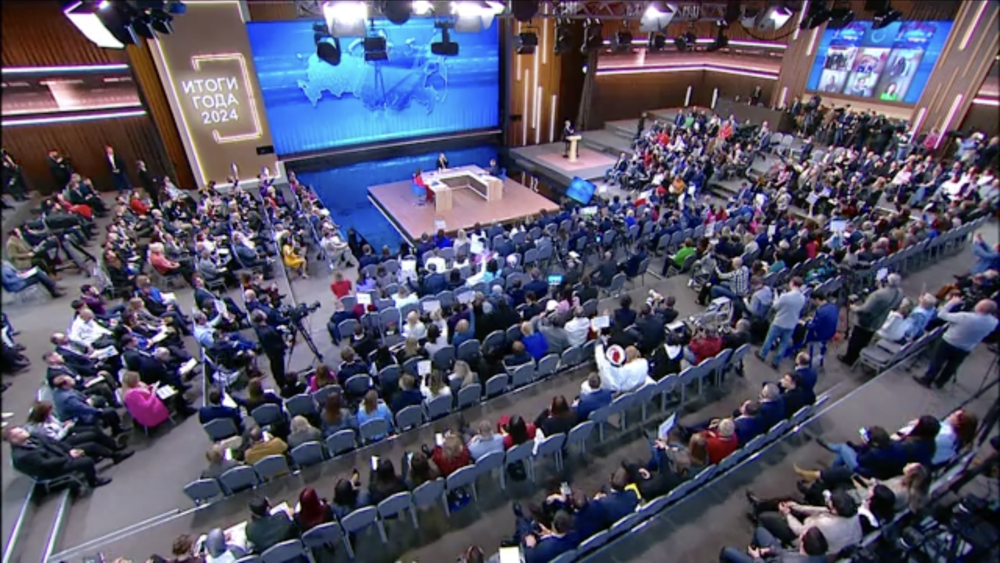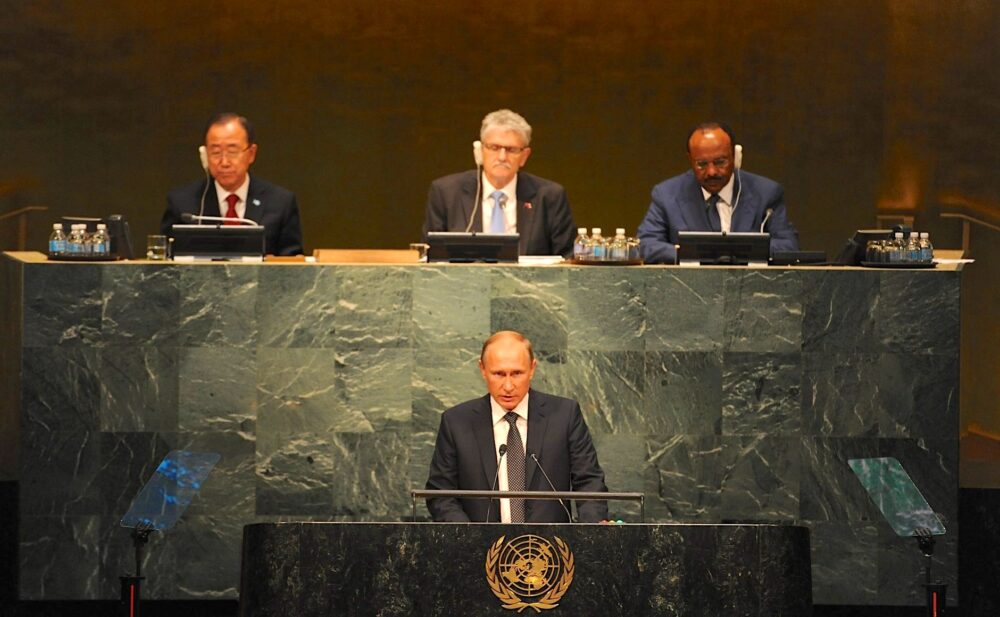The Russian president has said Russia actually won in Syria because the jihadist threat is apparently ended, which was Moscow’s goal all along. But he ignored what he’d previously said was the West’s role in that conflict, writes Joe Lauria.
By Joe Lauria
Special to Consortium News
Russian President Vladimir Putin said Russia’s goal to defeat jihadism in Syria had actually succeeded because the rebranded al-Qaeda force that seized power on Dec. 8 has put its extremist past behind it.
Putin said this in answer to a Western journalist at a Moscow news conference (video) on Thursday:
“Those who pay your salary would like to present the current developments in Syria as Russia’s defeat. I assure you that this is not the case, and here is why. We came to Syria ten years ago to prevent the creation of a terrorist enclave there, like the one that we saw in some other countries, for example, Afghanistan. We have achieved that goal, by and large.
Even the groups that were fighting against the Assad regime and the government forces back then have undergone internal changes. It is not surprising that many European countries and the United States are trying to develop relations with them now. Would they be doing this if they were terrorist organisations? This means that they have changed, doesn’t it? So, our goal has been achieved, to a certain degree.”
The remark aligns Putin with Western nations who claim that Hay’at Tahrir al-Sham (HTS) — which was al-Nusra Front and before that al-Qaeda in Syria — is no longer a terrorist group and is fit to rule Syria.
This conclusion, after less than 10 days of HTS in power, puts a spin on events that seeks to benefit both Russia and the West. Both sides now need to portray the militants as reformed extremists.
Putin is right to say that at least one of Moscow’s goals in Syria in 2015 was “to prevent the creation of a terrorist enclave there.”
(Other goals appeared to have been to save Russia’s Mediterranean bases in Syria, which they may still do, and to protect gas sales to Europe at the time — now lost to sanctions — against a rival pipeline project through Syria to Europe led by Qatar, which necessitated overthrowing Bashar al-Assad, who opposed it.)
Putin told the U.N. General Assembly from the podium in New York on Sept. 28, 2015 — days before Russia intervened in Syria at the governments’ invitation — that Moscow’s aim was to defeat jihadism there lest it spread, threatening regional and Russian security.
Russia had to that point already fought Western-backed jihadists in a 30-year struggle against encroachment into its sphere of influence by militant Islamism.
The support the U.S. and Gulf Arab nations gave these terrorist groups opened a three-decade Western rift with Russia that began in Afghanistan and ran across the Northern Caucasus to the Balkans and then into Syria.
Russia was opposed to regime change in Syria not only on principle, analysts and diplomats at the U.N. told me in June 2012, but because the likely new regime would be headed by an Islamist government inimical to Russian interests.
In his 2015 U.N. speech, Putin appealed to the U.S. to join Russia in a military campaign against the common enemy of ISIS, al-Qaeda and other jihadists, the way the U.S. and the Soviet Union had fought together against Nazism.
The Obama administration arrogantly rejected the proposal out of hand with some American commentators calling it “Russian imperialism.” But it would be odd to invite your adversary to join your imperial adventure.
In fact the United States was in alliance with al-Qaeda and other jihadi groups trying to overthrow al-Assad and did not want to fight them. Putin understood that the U.S. had long supported Islamist extremists.
He pointed this out at the U.N. in 2015:
“The situation is extremely dangerous. In these circumstances, it is hypocritical and irresponsible to make declarations about the threat of terrorism and at the same time turn a blind eye to the channels used to finance and support terrorists, including revenues from drug trafficking, the illegal oil trade and the arms trade.
It is equally irresponsible to manipulate extremist groups and use them to achieve your political goals, hoping that later you’ll find a way to get rid of them or somehow eliminate them. … the people you are dealing with are cruel but they are not dumb. They are as smart as you are. So, it’s a big question: who’s playing who here? …
Relying on international law, we must join efforts to address the problems that all of us are facing, and create a genuinely broad international coalition against terrorism. Similar to the anti-Hitler coalition, it could unite a broad range of parties willing to stand firm against those who, just like the Nazis, sow evil and hatred of humankind.” [Emphasis added.]
So the question is, have the HTS and lesser extremist groups in Syria actually changed their stripes? Have they really transformed from Jihad to Jefferson?
The U.S., the U.K. and the EU are in the process of dropping HTS’ terrorist designation and the U.S. in lifting the $10 million bounty on its leader’s head.
But it seems too early for Putin to say that the HTS — in nominal charge in Damascus — are no longer terrorists because the West would not be “developing relations” with them “if they were terrorist organisations.” It belies what he knows to be true, that the U.S. has had relationships for decades with some of the most notorious terrorists on the globe to achieve short-term strategic objectives.
Putin may be saying they aren’t terrorists anymore as a way to get out of admitting Russia likely failed in Syria to prevent terrorists from taking over. He did not cite Russian intelligence saying these are reformed killers, but said they must be reformed because otherwise the West would have nothing to do with them, when he knows full well the West has had plenty to do with them when they were openly terrorists.
This may just be Putin trying to find a creative way out of the fact that Assad’s overthrow appears to have been a Russian defeat unless the HTS are truly reformed. And if they are reformed, still very much uncertain, the U.S. and Turkey would have been behind it, not Russia.
A commenter on this article on X suggested Putin was just making fun of the journalist. Perhaps he was employing sarcasm but it was on the record and people take Putin seriously. He was not smirking, as Putin often does.
And if he was ridiculing the reporter and really thinks that HTS are still a bunch of terrorists, then Putin is admitting Russia failed in Syria.
What happens in Syria over the coming months will tell the rest of this story. Will Alawis, Christians and other minorities be left alone to live as they please?
Or will the HTS reanimate as terrorists to go after are these vulnerable peoples? Will the HTS serve the interests of stability in Syria and the region as Putin seems to think?
Or will they revert to what they have long been, especially now that they have power?
Joe Lauria is editor-in-chief of Consortium News and a former U.N. correspondent for The Wall Street Journal, Boston Globe, and other newspapers, including The Montreal Gazette, the London Daily Mail and The Star of Johannesburg. He was an investigative reporter for the Sunday Times of London, a financial reporter for Bloomberg News and began his professional work as a 19-year old stringer for The New York Times. He is the author of two books, A Political Odyssey, with Sen. Mike Gravel, foreword by Daniel Ellsberg; and How I Lost By Hillary Clinton, foreword by Julian Assange.
Please Support CN’s
Winter Fund Drive!![]()
Make a tax-deductible donation securely by credit card or check by clicking the red button:






What of Premeditated Provocations?
Re: cited passage: So, the question is: has the HTS and lesser extremist groups in Syria really changed their stripes?
Have they really transformed from Jihad to Jefferson?
Questions: Since when has Jefferson been the universal role model for non-Western ‘legitimate’ practitioners of the Islamic religion?
In what way do Islamic extremist terror-mongers differ from Judaic extremist terror-mongers?
Has the “most moral army” not just recently (Oct. 8th 2023) changed its ‘spots’ or has its intent, in truth, always been to ‘ethnically cleanse’ the “Other” through the practice of constant terror?
Duplicity is fine, so long as the perpetrators are on ‘our’ side.
Who/What have been the causes of so-called religious extremisms?
One possible answer: the ‘one-God’ doctrine, which mythologies are always the self-righteous side, no matter the side we are on!
Or perhaps evolution is to blame; definitely not ourselves, for we, critically thinking and reasoning beings are much more elevated than lowly animals of pure instinctive, reactive behaviors.
It could be another case of Putin’s dark humor also. I’m getting a vison or RT”s editor looking over at him on stage again with a smirk on her face as Putin delivered some dark humor a few months back.
You can’t judge Putin by Western standards. He actually is competent. Genuinely competent leaders is a rather shocking concept in the West. I suspect that it could be a case of Putin simply saying to the Western powers, “You have made your bed. Now you have to lie in it.” Well, we shall see. Wonderful if we can somehow avoid more war. The neocons have lost their collective minds and will happily kill us all rather than face the reality of their utter intellectual incompetence and moral depravity.
The remaining Russian bases in Syria are secure and I understand that most Russian resources in the ME are now in Libya. It is now Turkey, Israel and the US that will have to deal with the situation on the ground with the various factions now and going forward (forever..?), including the Kurds, while Russia sits back and looks on. Funny how things that go around, come around. In reality, the former Syria is now an ongoing problem for whom..? Not Russia, I think.
Thank you, mgr.
There is a very complicated and inexorable chess game being played here, one with so many innocents in its crosshairs. So it has always been, so we can only hope for that maxim to change one day.
I think Mr Putin a master of give and take, something he MUST be, and cognizant of what actually constitutes a ‘loss’ vs giving ground for the opponent to ruefully discover is actually quicksand. But only after having jumped in with both feet, and only having enough rope with which to hang himself—and again, if only there is a branch above.
With two of the world’s indisputably most treacherous allies—Türkiye and Israel—making it a scoundrels’ tripartate Axis with the United States government (as currently and corruptly constituted.)
As with all manner of other countries, ranging from the likes of Algeria (“Algeria – A Very Dirty War,” Australian Broadcasting Corporation (ABC), 1998, and Jeremy Keenan, “The Dark Sahara: America’s War on Terror in Africa,” London: Pluto Press, 2009) and the former Ba’athist Syria (Peter Neumann, “Suspects Into Collaborators,” London Review of Books (LRB), April 3, 2014, and Mamoon Alabbasi, “Iraq Asked Syria’s Assad to Stop Aiding ‘Jihadists’: Former Official,” Middle East Eye (MEE), Oct. 21, 2015), to Israel, the United Kingdom, and the United States (“Why Israel Created Hamas,” Swiss Policy Research, Oct. 23, 2023), Russia also has a past history of selectively providing intermittent strategic support to Islamist militants as proxies in order to create a pretext for “mowing the lawn” within their own sphere of influence and beyond and/or as a means of destabilizing territory and complicating resource access for their geostrategic competitors.
This is attested to by everything from the record of Far West Ltd (Peter Dale Scott, “The Real Grand Chessboard and the Profiteers of War (Part Two),” Foreign Policy Journal, Jan. 10, 2010) to the allegations of the late Alexander Litvinenko (John Simkin, “Alexander Litvinenko,” Spartacus Educational, May 2013) to the weapons, narcotic, and gold-smuggling intrigues of GRU-tied arms dealer Viktor Bout (Elaine Shannon, “The Merchant of Death Is Back in Action,” Politico Magazine, Dec. 12, 2022), the results of which were often in congruence with the interests of neoconservative and liberal interventionist actors in the Western world, especially during the 1990s and early 2000s (for example, see Matt Kennard, “When Tony Blair Backed Putin’s Brutal War,” Declassified UK, March 25, 2022).
In that sense, Russia may just be returning to the same roots that can also be observed in many other Weberian protection/extortion rackets (i.e., global and regional hegemonic nation-states) frequently instrumentalized to exclusively benefit certain transnational oligarchic interests.
Or was it a calculated retreat by Assad and Russia to let us suffer the chaos like dissolving the USSR in face of weaponized religious forces of chaos.
I really hope it was either sarcasm or Putin throwing a curveball to Washington to make them think he’s naive about HTS. Putin has been too slow in the past to perceive Washington as a possible partner. I thought he had figured out that is folly. Time will tell what he meant by this remark.
Yeh, first glance is that it is very sad to see Putin sink to the spin game but maybe he has another game in mind.
“So the question is, has the HTS and lesser extremist groups in Syria really changed their stripes? Have they really transformed from Jihad to Jefferson? ”
Thanks for the belly-laugh! :)
BTW, it wasn’t more than a few weeks ago that Al-juliani and HTS were using force to put down popular demonstrations in Idlib against them. Just like a modern Democrat mayor, but a long ways from Mister Jefferson.
I’ve been listening to Putin for 20 years. I know how he thinks and what he means when he speaks. He has the US (and its allies) down pat. You must learn to know tongue-in-cheek when you hear it from Putin. He’s the world’s most competent, reasonable leader. Wish we could ever have a president half as sensible. But that would never be allowed. The US and Israel are the hellholes of the world. Thank god for BRICS. As for al Jalani’s group, this comes from a reporter who was tortured by them for two years: All those guys want is to rape women and own a truck. Period. Anyone who falls for “they’ve changed” is an idiot.
Well, revolutionary violence is famously a moderating influence on the behavior of extremists, so I’m sure the Nusra front will bring halcyonic, sublime, and tender governance to Alawis and Shias and Christians.
Now that was sarcasm. From Mr. Putin, I’m not so sure; his comments look like typical government lies to me. It seems no one can be honest when talking about Syria.
Russia at this point is in CYA mode, hoping everyone forgets all the statements made about the historic friendship of Syria and the USSR/Russia, and Russia commitment to helping its historic ally. Russia has been using the USA’s poor treatment of their allies to Russia’s advantage, and so they don’t want to get slammed for how they didn’t do as much to help Syria as their words indicated.
Syria was always the oddball in the Axis of Resistance. The other nations and groups are all of a more popular revolutionary nature. Broad movements with mass popular support, especially among the youth. We just saw this in Lebanon where the American style “de-capitation” attack on Nasarullah had little long-term effect. In a movement, a new leader just steps forward to carry on the continued work of the movement.
But, Syria was always different from this, with son of Assad trying to extend his father’s government. The key was always whether it had genuine popular support. Such a government always tries to present that image, but in this case it was revealed to be false as the government collapsed from a general lack of support when it counted. In the same fashion that the people of DC did not rise up to defend the Democrats on Jan 6th, the people of Syria did not appear to rise up to defend Assad.
I rather suspect that Russia had realized this, leading to their strange dance of supporting their historic ally of Syria, but at the same time never going as far, as for example, using their air defenses in Syria to stop Israel from bombing Syria. The Astana process was always very odd. It looked like peace talks on the surface, but with Turkey as a part of the process even though they had invaded Syria and occupied portions of it and had been a clear enemy of the Assad regime, it never went anywhere.
In the end, Russia apparently chose a deal with its strategically important neighbor Turkey over its faltering historic ally in the Assad family. But, now they don’t want to come out and say it.
Whether he was joking or saving face, there is no way he actually believes that HTS is reformed.
Great article. Cuts through a lot of crap and tells it like it is.
Vanessa Beeley and Eva Bartlett have been having quite the debate on X/Twitter with Scott Ritter over whether to blame the Palestinians for their plight as some of them, including Hamas, have cheered on Assad’s downfall. If you have time, go tool around their X/Twitter accounts and you’ll be able to stumble across the strings. Very interesting. Especially since I respect the analyses all three bring to the discussion.
We turn down cooperation on fighting terrorism. We oppose regime change except when we want regime change. Finally, compare Russia’s exits from Afghanistan and Syria to our exits from anywhere, most recently Afghanistan.
Sadly the propaganda from the East is far more believable than the nonsensical propaganda from Washington & Westminster
What do you mean please?
It could be a sardonic remark as suggested by the question at the end of “This means that they have changed, doesn’t it?” It also suggests he is annoyed with the idea Russia was defeated by doing nothing to help Assad at this time, whereas there have been plenty of explanations on the “better fold than hold” theme, meaning that Assad had contributed to what happened by ignoring Russian and Iranian advice on what was coming. The situation was hopeless. Either way indicates Putin as an ordinary human, vulnerable to emotion, versus superman.
”Either way indicates Putin as an ordinary human, vulnerable to emotion, versus superman” I don’t think that’s good enough. He has advisers.
Thinking similar, Putin has a liking for mocking the AngloSaxon empire, he is anything but naive in his reasoning, which in the context of happenings in Syria lately, could be interpreted as a tongue in cheek remark, I do not believe that he really thinks those head choppers have changed their attitude at all. Sarcasm at best!